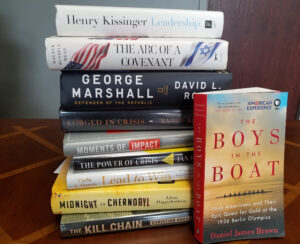The MEK List – Top Books of 2022 (or Thereabouts)
As the ancient saying goes, “Of making many books there is no end.” Happily, a companion truism tells us: “one can never have too many books.”
But alas, constraints of time comprise the foible. As an annual solution, many august publications (like the Economist, the Wall Street Journal, and the New York Times) offer up a more attainable top ten or more of recommended tomes.
 Like you, we at MEK have our own thought-provoking volumes. Some we love, some we read to understand or be informed. Thus, here, in the modest spirit of the marginal utility value of time well spent, are some wide-ranging MEK nonfiction considerations for the year, of new and old alike:
Like you, we at MEK have our own thought-provoking volumes. Some we love, some we read to understand or be informed. Thus, here, in the modest spirit of the marginal utility value of time well spent, are some wide-ranging MEK nonfiction considerations for the year, of new and old alike:
Forged In Crisis – The Power of Courageous Leadership in Turbulent Times – Harvard Business School historian Nancy Koehn rewards the reader with a bracing run through the lives and crises surmounted by the likes of shipwrecked Antarctica voyager Ernest Shackleton, venerated President Abraham Lincoln, renowned abolitionist Frederick Douglass, intellectual theologian-turned-Nazi-resister Dietrich Bonhoeffer, and legendary eco-crusader Rachel Carson. Among Koehn’s takeaways? Ambition only fuels a partial journey in becoming a leader. Finding one’s purpose propels one toward “impetus, strength and validation,” as one finds that real courageous leadership is often “messy, grueling, exhausting work.” Nice words, but Koehn eloquently demonstrates why. These leaders “watched and nourished big thoughts about what they saw.” A total of 517 insightful pages.
The Boys in the Boat – You may have seen the American Experience TV special. Here’s the even more worthy book. In the middle of depths of the Great Depression, a few dozen collegiate men show up to trade their minuscule free time for a grueling, demanding experience: crewing a nine-man boat for a nascent University of Washington team. Distilling down to nine crew members over a four-year season, the now-teamed-up men somehow pummel their way against all odds to transcend mere rowing in unison, achieving a state of mental, emotional, and physical “swing,” where mind and body powerfully merge.

Personal trials and trauma of a far different age reshape minds and bodies alike, producing an unlikely band that humiliates Hitler and his Herrenrasse at the 1936 Berlin Olympics, where the unlikely champions blast their Husky Clipper across the finish line barely one second ahead of the highly favored Nazi team for the gold. As their legendary boat craftsman notes: “Rowing…it’s a symphony of motion…when you near perfection…it touches the you of ‘yous’.” While there are plenty of opportunities to cheer, this extraordinarily well-written book also makes one think.
Leadership – Six Studies in World Strategy – Like him or not, Henry Kissinger has stood upon a profound bridge crossing the intersection of two dramatically different centuries, serving as influencer, observer, and commentator. In this remarkable 2022 review he writes: “For strategies to inspire the society, leaders must serve as educators—communicating objectives, assuaging doubts and rallying support…The vital attributes of a leader in these tasks, and the bridge between the past and the future, are courage and character…Courage summons virtue in the moment of decision; character reinforces fidelity to values.” Through the heuristic lens of six distinct world figures – Konrad Adenauer, Charles de Gaulle, Richard Nixon, Anwar Sadat, Lee Kuan Yew, and Margaret Thatcher (all of whom Kissinger knew personally and professionally) – Kissinger thoughtfully traces key grand strategies and their impact down to today. If you do nothing else, stand in the bookshop and read the 12-page introduction. As Kissinger quotes Winston Churchill, “In history lie all the secrets of statecraft.”
Midnight in Chernobyl – The Untold Story of the World’s Greatest Nuclear Disaster – This recent page-turner gives new meaning to “the kleptocratic bungling, the nepotism, the surly inefficiencies, and the ruinous waste” that delivered the Soviet Union (and the world) into an intimate relationship with fatally flawed Reactor Number Four of the Chernobyl Atomic Energy Station. With gripping direct interviews with key surviving players (including the unfortunate plant developer and director), combined with meticulous research of the catastrophic explosion (pre and post), and fast-paced literary tempo, readers will uncover much detailed insight to why things are the way they are today in Mother Russia and Ukraine. (FYI, this book inspired the MEK blog “Insightful Courage in an Age of Volatility“)
The Kill Chain – Defending America in the Future of High-tech Warfare – Wonder why it’s so important to consider why the People’s Republic of China presently holds a commanding lead in hypersonic missile technology and over-the-horizon radar? Top policy advisor Christian Brose identifies critical aspects of the “kill chain,” which end game focuses on taking lightning-fast unstoppable action. Sound simple? “Without the ability to act, nothing else really matters.” Brose shows why and how Chinese leaders profoundly understand and embrace the “kill chain,” offering example after specific example. The West previously focused on platforms (can you say “aircraft carrier”), which has created a worrisome imbalance. Is there hope? Yes, the WSJ-recommended expert writes, “but time is running out.”
Moments of Impact – How to Design Strategic Conversations that Accelerate Change – This book has been around for a few years, but it captures key and actionable steps to analyze broad swaths of data and group characteristics. More importantly, it serves up thoughtful ideas on how to create a corporate environment that embraces change. In a time where change management has become a veritable industry, where VUCA principles (volatility, uncertainty, complexity, and ambiguity) have seized a dominant position, leaders need to “eradicate as many time-sucking, energy-depleting strategy meetings as possible” – and replace them a new capacity to shape a company or organization. If you’re an advocate of design thinking, this one might offer some real gems.
Lead to Win – How to Be a Powerful, Impactful, Influential Leader in Any Environment – This 2022 book makes some powerful claims, but it first caught our eye through an unqualified go-read-this-book recommendation in the Wall Street Journal. Author Carla Harris is a former managing director of Morgan Stanley. A proven investment banker and adviser to President Barrack Obama, Harris describes the move from an “individual contributor” in a company to one of a high-impact leader. She backs it up with specific “how-to” tactics at every level. The fact that she is also an accomplished Gospel singer with four albums and a performance resume that includes Carnegie Hall makes things even more interesting.
The Arc of a Covenant – The United States, Israel, and the Fate of the Jewish People – Here’s another Wall Street Journal-recommended tome, authored by the legendary Walter Russell Mead. Lots of surprises in this one. It’s particularly timely, given the fact that at the time of writing, the indefatigable Benjamin Netanyahu is working to form yet another a new government in the state of Israel, one that promises to again be controversial. Mead demolishes numerous myths and illuminates key forgotten facts, like the left-wing support of liberal New Dealers who influenced Harry Truman’s policies toward the then-fledgling Jewish resurrection of a modern Israel. Readers will also find surprising impact from Soviet dictator Joseph Stalin in the Jewish struggle for independence. Good insight why antisemitism arises anew at the beginning of the third year of our second 21st century decade.
George Marshall – Defender of the Republic – When someone draws diverse and unrelenting praise from Walter Isaacson (Steve Jobs), Andrews Roberts (Walking with Destiny, Churchill), General (ret) David Petraeus, and Pulitzer-Prize winner John Lewis Gaddis, that might suggest a worthy consideration. David Roll scores dramatically with an insightful and compelling of a five-star general who many said “won the war.” The only American General to ultimately serve tours as Secretary of War (Defense) and Secretary of State, General George Marshall offers a life of numerous (and inspiring) feats, including working tirelessly, but unsuccessfully as a special U.S. Envoy to end the Chinese Civil War (and the ultimate rise to power of Mao) and (to his great surprise) receiving the Nobel Peace Prize. As Harvard honored him, “an American to whom Freedom owes an enduring debt of gratitude, a soldier and statesman whose ability and character brook only one comparison in the history of this nation,” speaking, of course, about another “George,” this one named “Washington.” Many stories of Marshall’s insightful leadership and humility are in this work, putting purpose before personal achievement. Very readable and intuitive. Have read this one more than once.
The Power of Crisis – How Three Threats – and Our Response – Will Change the World – This sobering 2022 treatise details a view of the world’s most powerful nation deadlocked in polarized, resource-sapping paralysis, a global economy still wanly trying to find solid ground after unprecedented pandemic shock, and perhaps most challenging of all, a relentless charge of new disruptive technologies which near-daily change the way we live. “Lethal autonomous drones, cyberwarfare, biotechnology, and artificial intelligence (AI) are no longer the stuff of science fiction.” Separately, one notes that with a Russian nuclear threat amplified by activation of the Soviet-era “Dead Hand” (an automated nuclear response initiated by seismic, light, radioactivity, and pressure sensors), a Chinese autocratic government whose openly stated goal is to dominate the global economy by no later than 2049, and a host of other macro challenges, humanity will be forced to change, whether it wants to or not. The author outlines a decidedly secular human response, leaning to the left. Perhaps the best view of this work is that of a vivid snapshot of humanity in 2022, cast adrift from its moorings with narrowing options for survival. A grim read.
Have a personal favorite (or one of your own)? Avail yourself of the comments section, or write us here.
